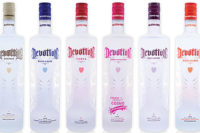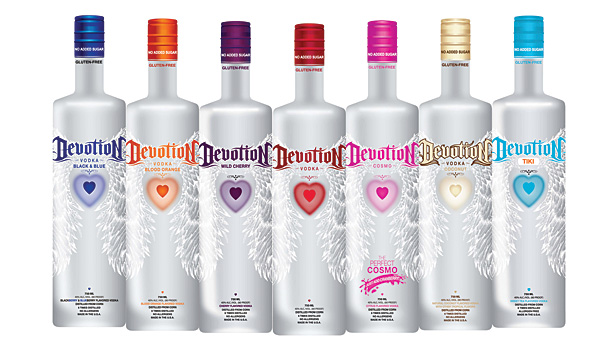Devotion Vodka’s new gluten-free Tiki Tea exceeds sales expectations
New Tiki Tea vodka variations expected by February




Although now best known for its gluten-free and no-added-sugar attributes, the Devotion Vodka brand actually got its start in the club scene. Drew Adelman, chief executive officer of the brand’s Red Bank, N.J.-based parent company Devotion Spirits Inc., previously was involved with nightclub chain Polly Esthers Culture Club. The experience inspired him to venture into the spirits side of the business to craft a better way to enjoy alcohol.
“We wanted to come up with something that was conducive to our lifestyle, like for those trying to stay healthy, stay fit, but also [have fun] in nightclubs,” he says. “It was kind of a clash of two worlds to come up with something [alcoholic] but as close to [healthy] as we can get.”
In creating the Devotion Vodka brand, the team had four main priorities: They wanted to develop a premium vodka that is made in America, gluten free and sugar free with a great taste profile. To go along with all of these attributes, they also wanted an easily relatable brand image.
“The name is something that can relate to everybody,” Adelman explains. “I can ask anybody wherever I go, ‘Describe yourself in one sentence using the word devotion,’ and everybody can do it, so that shows me that [it’s] related to everybody.”
For example, Adelman says his devotion to his daughter served as an inspiration for the brand’s label. “I call her ‘Angel,’ so we put the angel wings on there, and then in the middle of the bottle, you’ll see [two hearts], so it’s basically her heart and my heart together.”
The other portion of the brand’s easily relatable image is its “American Made” quality, which should relate to every American, Adelman says. The company noticed that the vodka market is full of foreign alcohols, so it wanted to offer a more domestic product, he says.
Better-for-you image
Devotion Vodka’s other brand priorities now also are noted prominently on the bottles of vodka. Late last year, the Alcohol and Tobacco Tax and Trade Bureau (TTB) granted Devotion Vodka permission to print “Gluten-Free” and “No Added Sugar” on its bottles to promote these product attributes.
Earning TTB permission was a three-year process that involved the company’s flavor chemists, distiller chemists, distillers and tons of documentation, says Michael Calleja, partner and chief operating officer for Devotion Spirits. “We had to go through a lot of red tape, access everybody’s information right down to what corn we’re using, everything that we’re doing, and compile all that,” he explains. “It’s a new thing, so anything we do new with the TTB takes time. So we submitted everything, we submitted it over and over again, and finally … they realized we were devoted to the cause of putting this on our bottle, and they wound up saying that we have [sufficient] information to make sure this happens.”
As a gluten-free vodka, Devotion Vodka is 100 percent made from corn, which Adelman and Calleja note is more expensive to produce than vodkas that are not completely made from corn, but this distinction helps set the brand apart.
“A lot of people say they’re gluten free, but I always say, ‘Show me where it says it on the bottle,’ and they can’t, because they’re 97 percent gluten free or 90 percent gluten free,” Adelman says. “We’re 100 percent gluten free.”
Being 100 percent gluten free has opened up many doors for the brand, Adelman notes. Restaurant chains, including Red Robin, Applebee’s and Houlihan’s, have started carrying it as a gluten-free option, and other restaurants have included it on gluten-free menus, he says. In addition, Chicago-based market research firm Mintel predicts that the gluten-free products category will reach $15 billion in annual sales by 2016, compared with $10.5 billion in 2013, giving the brand even more room to grow.
In addition, Devotion Vodka does not contain any added sugar. “What people don’t realize is, when we say ‘No Added Sugar,’ there’s a number of other companies out there that use sugar and other chemicals as a soothing agent after distillation,” Calleja explains. “You need sugar to distill vodka, but after it’s distilled, there’s obviously no sugar in there, because it has gone through the distillation process.”
Other brands use the added sugar to enhance the taste profiles of their vodkas, but Devotion Vodka has a different secret weapon.
Flavor specialty
To create the well-rounded, mature flavors of Devotion Vodka, as Calleja describes them, the company teamed up with flavor experts at Allen Flavors Inc., Edison, N.J.
“They made us use ionized water and do reverse osmosis, which basically gets our water down to a hospital-grade water,” Calleja explains. “It has zero impurities, which is very important in making any kind of beverage. The water is the most important source, so getting our water at zero impurities allows us to start with a really strong base.
“We distill it six times … with extremely pure water and use [Allen Flavors’] technology to have a sugar-free and gluten-free product that actually excellent,” he says.
In partnership with Allen Flavors, Devotion Spirits offers its 80-proof vodka in Black & Blue, a blackberry and blueberry variety; Blood Orange; Wild Cherry; Cosmo; and Coconut flavors, as well as an Original variety, which all are available in 22 states at a suggested retail price of $19.99 for a 750-ml bottle, according to Calleja.
At present, the brand’s flagship Original vodka and Black & Blue varieties lead the brand’s sales charge toward the 50,000 case mark, which the brand hopes to hit this year. However, a new popular flavor might help accelerate this growth.
Competitive spirit
At the end of May, Devotion Vodka added a Tiki Tea sweet-tea-flavored vodka to its lineup, and already the company has had to ramp up production to meet demand, Calleja says.
“We were supposed to launch it in the whole East Coast, and actually throughout the whole country, but as soon as we launched it in New Jersey, it took off like none of our other flavors had taken off,” Calleja says. “We basically produced [a limited] amount, we had to allocate it just to New Jersey, and we had to even stop [its distribution] in Connecticut, Massachusetts and New York because the New Jersey sales were so high.
“We’re slowly opening up Massachusetts and New York with small-allocation orders, but basically the sales in just those three states right now, for our product, is all that we can sell right now,” he continues. “We’re going into major production to fill those backorders, and hopefully by the end of September, we’ll have launched it in the rest of the country.”
Adelman says the company sold 6,000 cases of the Tiki Tea variety in the first 10 weeks, which far exceeded the company’s sales expectations.
Part of Tiki Tea’s popularity might stem from its unique flavor profile, compared with other tea-flavored vodkas, Calleja says. “Where the other tea [vodkas] are sweet teas, and they have that candy effect, ours is very calm — it doesn’t have that sharp bite at all.”
The idea for the flavor actually came from an on-premise experience at a tiki bar. Adelman and Calleja tasted a different brand’s tea-flavored vodka but found that it was too sugary for their taste preferences. They then decided to make a proposition to the bar owner, asking if the venue would carry Devotion Vodka’s tea-flavored spirit if they could create a great-tasting product with less sugar. A year later, Devotion Vodka brought back Tiki Tea, and the bar put it to a taste test. “We blew the doors off everybody,” Adelman says, “and then [Tiki Tea] started blowing off the shelves.”
To follow up on this popularity, Devotion Vodka is experimenting with Tiki Tea with Mango, Tiki Tea with Raspberry, and Tiki Tea with Peach varieties, which the company is hoping to launch by February 2015, Adelman says.
Looking for a reprint of this article?
From high-res PDFs to custom plaques, order your copy today!








